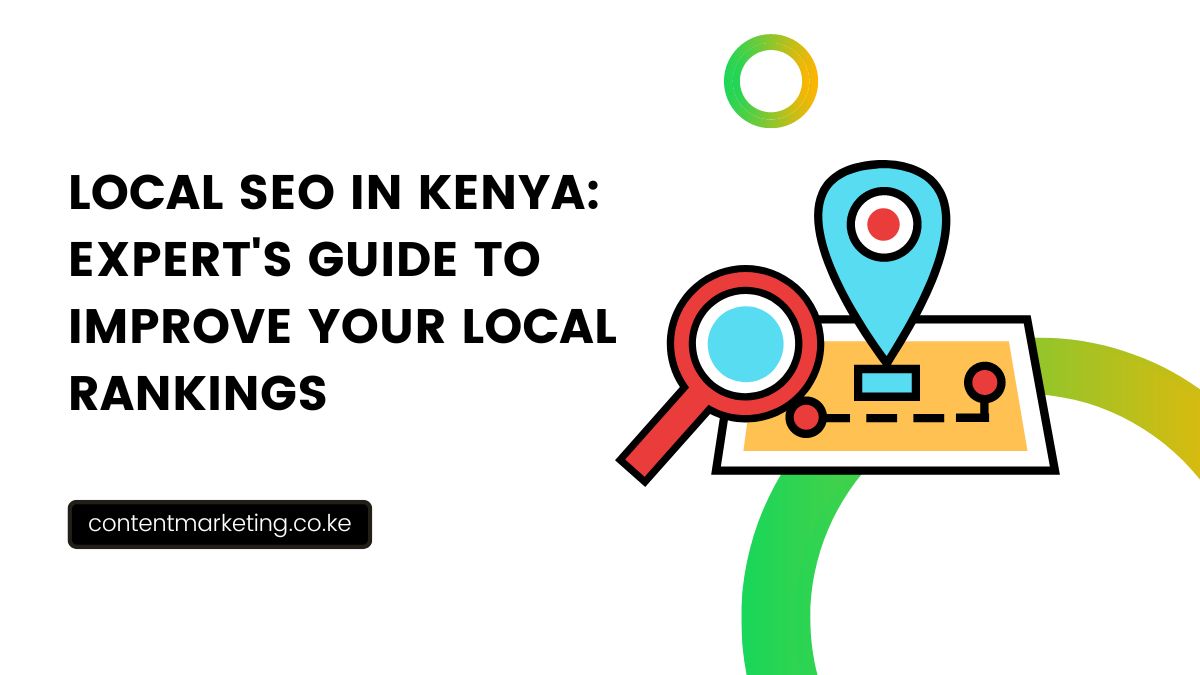Local SEO in Kenya: Expert’s Guide to Improve Your Local Rankings
Last updated on December 12th, 2023 at 12:17 pm
Are you a business owner in Kenya looking to improve your local search rankings?
Local SEO is the solution to increasing your visibility online, and it’s crucial for businesses that want to attract customers from their surrounding areas.
With the rise of mobile searches and location-based services, optimizing your website for local SEO has become more important than ever before.
But where do you start?
In this expert’s guide, we’ll take you through all the necessary steps to improve your local rankings in Kenya.
So get ready to boost your business’s online visibility and attract more customers with our comprehensive local SEO strategy!
Table of Contents
The Importance of Local SEO in Kenya
In today’s digital age, local businesses in Kenya need to have a strong online presence to stay competitive and attract customers.
Local SEO (Search Engine Optimization) plays a crucial role in helping businesses improve their visibility in local search results.
And by optimizing your website and online profiles for local searches, you can connect with potential customers in your target area and drive more foot traffic to your brick-and-mortar store.
Local SEO in Kenya is essential for small businesses, service providers, and even multinational companies looking to capture the attention of local consumers.
Understanding the Basics of Local SEO in Kenya
Before diving into the strategies and techniques to enhance your local rankings in Kenya, it’s essential to understand the basics of local SEO in Kenya.
Local SEO focuses on optimizing your online presence to target specific geographic locations.
It involves optimizing your website, creating a Google My Business profile, managing local business listings, and implementing various strategies to improve visibility in local search results.
Leveraging local SEO tactics, you can ensure that your business appears in front of potential customers when they search for relevant products or services in your area.
#1. Conducting Keyword Research for Local SEO
Identifying Relevant Keywords for Local Searches in Kenya
Keyword research is the foundation of any successful SEO campaign.
For local SEO in Kenya, it’s crucial to identify keywords that are specific to your target audience and location.
Start by brainstorming a list of keywords that are relevant to your business and the products or services you offer.
Consider including location-specific terms, such as city names or landmarks, in your keyword list to capture local search intent.
For example, if you run a restaurant in Nairobi, you might target keywords like “best restaurants in Nairobi” or “top dining spots in Kenya.”
Tools and Techniques for Local Keyword Research
To effectively conduct keyword research for local SEO in Kenya, you can utilize a variety of tools and techniques.
Google Keyword Planner is a popular tool that provides insights into search volume, competition, and keyword ideas.
It can help you identify relevant keywords for your business and prioritize them based on search volume and competition.
Additionally, you can explore local keyword research tools like SEMrush and Moz to gain deeper insights into local search trends and competitor keywords in Kenya.
Steps to use Google keyword planner for find local keywords
Sure, here are the steps on how to use Google Keyword Planner to find local keywords:
- Go to the Google Keyword Planner website and sign in to your Google Ads account.
- Click the “Discover new keywords” tab.
- In the “Keyword ideas” section, enter a word or phrase related to your business.
- Under “Location,” select the city or region where you want to target your keywords.
- Click the “Get ideas” button.
- Review the list of keywords that are returned. Pay attention to the following metrics:
- Search volume: This is the number of times people have searched for the keyword in the past month.
- Competition: This is a measure of how difficult it will be to rank for the keyword in search results.
- Suggested bid: This is the amount of money you would need to spend per click on the keyword.
- Select the keywords that are most relevant to your business and that you think you have a good chance of ranking for.
- Add the keywords to your Google Ads campaign.
Analyzing Competitor Keywords in Your Local Area
Analyzing competitor keywords can provide valuable insights and help you discover opportunities to outrank your competition in local search results.
Identify your top competitors in Kenya and analyze the keywords they are targeting.
Tools like SEMrush and Ahrefs allow you to analyze competitor websites and discover the keywords they are ranking for.
SEE, by understanding your competitors’ strategies, you can refine your own keyword targeting and gain a competitive edge in local SEO.
#2. Optimizing Your Website for Local SEO
Creating a Locally Relevant Domain Name
When optimizing your website for local SEO in Kenya, having a locally relevant domain name can give you an advantage.
Consider incorporating location-specific terms or keywords into your domain name.
For example, if you operate a plumbing business in Mombasa, a domain name like “mombasaplumbing.com” can signal to search engines and potential customers that your business serves the local area.
Optimizing Meta Tags and Title Tags for Local Keywords
Meta tags and title tags are HTML elements that provide information about a webpage’s content.
Optimizing these tags with local keywords can help search engines understand the relevance of your web pages to local searches.
Ensure that your meta tags and title tags accurately describe the content on each page and include relevant keywords specific to your target location.
For example, a title tag for a Nairobi-based hair salon could be “Best Hair Salon in Nairobi: Transform Your Look with Our Expert Stylists.”
Incorporating Local Keywords into Website Content
Beyond meta tags and title tags, incorporating local keywords into your website content is crucial for local SEO in Kenya.
Create informative and engaging content that targets local search intent.
Include local keywords naturally throughout your website pages, such as in headings, paragraphs, and image alt tags.
Remember to provide valuable information to your visitors while seamlessly integrating local keywords to enhance your local relevance.
Implementing Schema Markup for Local Businesses
Schema markup is structured data markup that helps search engines understand the content on your website.
By implementing schema markup for local businesses, you can provide additional context to search engines about your business name, address, phone number, opening hours, and other relevant information.
This markup helps search engines display rich snippets in search results, such as star ratings, reviews, and other important details that can attract potential customers to your website.
#3. Building and Optimizing Google My Business Profile
Setting Up Your Google My Business Account
Google My Business is a powerful tool for local businesses to establish their online presence and appear in Google’s local search results.
Start by setting up your Google My Business account and claiming your business listing.
Provide accurate and up-to-date information about your business, such as your address, phone number, website, and opening hours.
It’s important to verify your listing to ensure its authenticity and improve your chances of ranking higher in local searches.
Optimizing Your Business Information for Local Searches
Optimizing your business information on Google My Business is crucial for improving your local rankings.
Make sure your business name, address, and phone number (NAP) are consistent with the information on your website and other online directories.
Choose relevant categories that accurately describe your business. Add a compelling business description that highlights your unique selling points and incorporates local keywords.
Remember to include high-quality images and videos that showcase your products, services, and the overall ambiance of your business.
Encouraging Customer Reviews and Managing Ratings
Customer reviews play a significant role in local SEO and influencing potential customers’ decisions.
Encourage your satisfied customers to leave reviews on your Google My Business profile.
Respond to both positive and negative reviews in a timely and professional manner, showcasing your commitment to customer satisfaction.
Actively managing your ratings and reviews demonstrates your dedication to providing excellent service and can positively impact your local rankings.
Utilizing Google My Business Posts and Q&A Feature
Take full advantage of the additional features offered by Google My Business to enhance your local SEO efforts.
Regularly create Google My Business posts to promote upcoming events, special offers, or new products and services.
These posts appear directly in your Google My Business profile and can attract attention from potential customers.
Additionally, actively engage with the Q&A feature on your profile, providing accurate and helpful responses to inquiries from potential customers.
This engagement not only improves your local visibility but also builds trust with your audience.
#4. Local Business Listings and Citations
Identifying High-Quality Local Directories in Kenya
Local directories are online platforms that list businesses within specific geographic locations.
Identifying high-quality local directories in Kenya is essential for building your online presence and improving your local rankings.
Look for directories that are popular and relevant to your industry. Some examples of local directories in Kenya include Yellow Pages Kenya, Kenya Business Listing, and Findit Kenya.
Submitting your business to these directories can help increase your visibility in local searches.
Submitting Your Business to Local Directories
Once you’ve identified the relevant local directories, submit your business information to these directories.
Ensure that your NAP information is consistent across all directories and matches the information on your website and Google My Business profile.
Include additional details such as your website URL, business description, and relevant categories.
Listing your business in local directories improves your online visibility and provides valuable backlinks to your website, which can positively impact your local SEO efforts.
Consistency in NAP (Name, Address, Phone) Information
Consistency in your NAP information is crucial for local SEO.
Search engines rely on accurate and consistent information to determine the legitimacy and relevance of your business.
Make sure your business name, address, and phone number are consistent across all online platforms, including your website, Google My Business profile, local directories, and social media profiles.
Inconsistencies in NAP information can confuse search engines and potential customers, leading to lower local rankings and a loss of trust.
Managing Online Reviews on Local Directory Websites
Local directory websites often allow customers to leave reviews and ratings.
It’s important to actively monitor and manage your online reviews on these platforms.
Encourage satisfied customers to leave positive reviews, and promptly address any negative reviews or customer concerns.
Responding to reviews in a professional and courteous manner shows your commitment to customer satisfaction and can help mitigate any negative impact on your local rankings.
Regularly monitor your listings on local directories to ensure that the information is up to date and accurate.
#5. Localized Content Marketing Strategies
Creating Engaging and Informative Localized Content
Creating engaging and informative localized content is a powerful strategy for improving your local SEO in Kenya.
Develop blog posts, articles, and other forms of content that provide value to your target audience while incorporating local keywords naturally.
Share local news, events, or stories that are relevant to your industry or area.
By producing high-quality content that resonates with your local audience, you can attract more visitors to your website and establish yourself as an authority in your niche.
Targeting Local Keywords in Blog Posts and Articles
When creating blog posts and articles, target local keywords to enhance your local SEO efforts.
Identify keywords that are relevant to your business, industry, and the local area.
For instance, if you run a safari tour company in Kenya, you can create content around keywords like “best safari experiences in Kenya” or “top wildlife destinations in Nairobi.”
Incorporate these keywords naturally throughout your content to increase its visibility in local search results.
Leveraging Local Influencers for Content Promotion
Leveraging local influencers can significantly amplify your content’s reach and improve your local SEO in Kenya.
Identify influencers in your industry or local area who have a substantial following and engage with their audience.
Collaborate with influencers by featuring them in your content, having them review your products or services, or organizing joint events.
By tapping into their existing audience and networks, you can increase brand awareness, drive more traffic to your website, and improve your local rankings.
Engaging with the Local Community through Content
Building strong connections with the local community is vital for local SEO success.
Engage with the local community through your content by highlighting local events, initiatives, or organizations.
Showcase your involvement in community projects or sponsorships.
Demonstrating your commitment to the local community, you can build trust and loyalty among local customers, leading to improved local rankings and increased business opportunities.
#6. Online Reputation Management for Local Businesses
Monitoring and Responding to Online Reviews
Online reviews have a significant impact on consumers’ purchasing decisions, making reputation management a crucial aspect of local SEO in Kenya.
Monitor online review platforms, social media, and other channels to stay informed about customer feedback.
Respond promptly and professionally to both positive and negative reviews.
Express appreciation for positive reviews and address any concerns or issues raised in negative reviews.
Showcasing your commitment to customer satisfaction can enhance your reputation and improve your local rankings.
Handling Negative Reviews and Managing Reputational Issues
Negative reviews are inevitable, but how you handle them can make a difference.
When encountering negative reviews, respond in a calm and empathetic manner.
Acknowledge the customer’s concerns, apologize if necessary, and offer a resolution or explanation publicly.
Building Trust and Credibility through Testimonials and Case Studies
Testimonials and case studies are powerful tools for building trust and credibility.
Collect testimonials from satisfied customers and showcase them on your website and social media platforms.
Highlight success stories and case studies that demonstrate how your products or services have positively impacted customers.
Utilizing Social Proof to Enhance Local Reputation
Social proof plays a crucial role in local SEO and reputation management.
Encourage customers to leave reviews and ratings on platforms like Google, Facebook, or industry-specific review sites.
Display badges or certifications that demonstrate your expertise or quality standards. Leverage social proof in your marketing materials, such as displaying the number of satisfied customers or successful projects.
#7. Mobile Optimization for Local Searches
Ensuring Mobile-Friendly Website Design and User Experience
With the increasing use of mobile devices, optimizing your website for mobile users is paramount.
Ensure that your website has a responsive design that adapts to different screen sizes and provides a seamless browsing experience on mobile devices.
Pay attention to page load speed, navigation ease, and readability on mobile devices.
A mobile-friendly website design improves user experience, reduces bounce rates, and positively impacts your local rankings.
Optimizing Website Speed and Performance for Mobile Users
Website speed and performance are critical factors in mobile optimization and local SEO in Kenya.
Optimize your website by minimizing file sizes, leveraging browser caching, and using content delivery networks (CDNs) to deliver your content faster to users.
Conduct regular website audits to identify and fix any performance issues that may negatively impact your local SEO efforts.
A fast-loading website ensures a positive user experience, increases engagement, and improves your local rankings.
Implementing Click-to-Call and Click-to-Map Features
For local businesses, implementing click-to-call and click-to-map features can enhance the user experience and drive more conversions.
Incorporate click-to-call buttons on your website, making it easy for mobile users to contact you directly with a single tap.
Similarly, include click-to-map functionality to help users find your business location quickly and navigate to it effortlessly.
These features improve user convenience and encourage more interactions with your business, leading to improved local rankings.
Utilizing Location-Based Mobile Advertising
Location-based mobile advertising allows you to target potential customers who are physically near your business location.
Use mobile advertising platforms like Google Ads or social media advertising to create location-specific campaigns.
Set geographical parameters that align with your target audience in Kenya, ensuring that your ads reach users who are most likely to visit your business.
Location-based mobile advertising can increase brand visibility, drive foot traffic, and positively impact your local SEO efforts.
#8. Local Link Building Strategies
Building Relationships with Local Influencers and Bloggers
Building relationships with local influencers and bloggers can result in valuable backlinks and increased brand exposure.
Identify influential bloggers or social media personalities in your industry or local area and reach out to them.
Offer to provide expert insights, collaborate on content creation, or sponsor their events or projects.
Guest Blogging and Collaborative Content Creation
Guest blogging is an effective strategy for earning backlinks and expanding your reach in local SEO.
Identify authoritative websites or local blogs that accept guest contributions.
Pitch unique and engaging content ideas that align with their audience’s interests.
By contributing high-quality articles, you can establish yourself as an expert in your field, gain exposure to a new audience, and acquire valuable backlinks that improve your local rankings.
Participating in Local Events and Sponsorships
Active participation in local events and sponsorships not only boosts your brand visibility but also creates opportunities for local link building.
Get involved in community events, conferences, or trade shows relevant to your industry.
Sponsor local sports teams, charities, or cultural events. In return, you may receive backlinks and brand mentions on event websites, news articles, or social media posts.
These local backlinks can strengthen your local SEO efforts.
Utilizing Social Media for Local Link Building
Social media platforms offer excellent opportunities for local link building.
Engage with local organizations, businesses, and influencers on social media.
Share relevant content, tag local entities, and participate in conversations.
By building relationships and networking on social media, you increase the likelihood of earning backlinks and collaborations.
Incorporate your website links in social media profiles and posts to drive traffic and enhance your local SEO performance.
#9. Harnessing the Power of Online Directories
Identifying Relevant Online Directories for Your Business
Online directories provide a valuable platform for local businesses to gain visibility and improve local SEO in Kenya.
Identify relevant online directories in Kenya that are specific to your industry or location.
Examples include industry-specific directories, local business associations, or regional directories.
Ensure that these directories have a good reputation, high domain authority, and a substantial user base.
Listing your business in such directories can boost your local rankings and attract targeted traffic.
Optimizing Directory Listings with Local Keywords
When submitting your business to online directories, optimize your listings with local keywords.
Include your business name, address, and phone number (NAP) consistently across all directories.
Write a compelling business description that incorporates relevant local keywords.
Add additional information such as your website URL, business hours, and services offered.
Optimizing directory listings with local keywords enhances your online visibility and improves your local SEO performance.
Monitoring and Updating Directory Listings Regularly
Maintaining accurate and up-to-date directory listings is essential for local SEO.
Regularly monitor your directory listings to ensure that all information, including NAP details, is accurate and consistent.
Update any changes to your business information promptly to avoid confusion or potential negative impacts on your local rankings.
Additionally, monitor user reviews on directory platforms and respond to them promptly and professionally.
Leveraging Industry-Specific Directories for Local SEO
Industry-specific directories provide niche exposure and targeted visibility for your business.
Identify directories that cater to your specific industry or niche in Kenya.
For example, if you operate a restaurant, consider listing your business on food and dining directories specific to your city or cuisine.
These industry-specific directories attract users with specific interests, increasing the chances of reaching your target audience and improving your local SEO.
Read also: 5 Best Business Listing Directories In Kenya
#10. Local SEO Analytics and Tracking
Setting Up Google Analytics for Local SEO
To measure the effectiveness of your local SEO efforts, set up Google Analytics for your website.
This powerful tool provides valuable insights into user behavior, website traffic, and conversions.
Track key metrics such as organic search traffic, bounce rates, time on site, and goal completions.
Analyzing these metrics helps you understand the impact of your local SEO strategies and make data-driven adjustments to improve your performance.
Tracking Local SEO Performance Metrics and KPIs
In addition to Google Analytics, track specific local SEO performance metrics and key performance indicators (KPIs) to assess the success of your strategies.
Monitor keyword rankings for local keywords, local search visibility, organic search traffic from specific locations, and conversions from local searches.
By tracking these metrics, you can gauge the effectiveness of your local SEO efforts and identify areas for improvement.
Analyzing and Interpreting Local Search Data
Analyzing and interpreting local search data is crucial for refining your local SEO strategies.
Dive deeper into keyword data to identify trending local search terms, search volume, and competition levels.
Understand the demographics and behaviors of your local audience through user data.
Identify patterns, preferences, and emerging opportunities to optimize your content, targeting, and engagement strategies.
Making Data-Driven Adjustments to Local SEO Strategies
Based on the insights gained from analytics and data analysis, make data-driven adjustments to your local SEO strategies.
Refine your keyword targeting, optimize content for local intent, and adjust your website and off-page optimization techniques.
Focus on areas that show the most significant impact and prioritize strategies that align with the interests and preferences of your local audience.
Recap of Key Strategies to Improve Local Rankings in Kenya
In this expert’s guide to improving local rankings in Kenya, we have explored various strategies to enhance your local SEO efforts.
By implementing these strategies, you can increase your visibility in local search results, attract targeted traffic, and drive more customers to your business.
Let’s recap the key strategies discussed:
- Conduct thorough keyword research for local searches in Kenya.
- Optimize your website with locally relevant domain names, meta tags, and content.
- Create and optimize your Google My Business profile.
- List your business in high-quality local directories and manage online reviews.
- Develop engaging localized content and leverage local influencers for promotion.
- Monitor and manage your online reputation through testimonials and social proof.
- Optimize your website for mobile users and leverage location-based mobile advertising.
- Build relationships with local influencers, participate in events, and utilize social media for link building.
- Harness the power of online directories for increased visibility.
- Track and analyze local SEO performance metrics to make data-driven adjustments.
Now that you have a comprehensive understanding of local SEO strategies for Kenya, it’s time to take action and boost your local online presence.
Implement these strategies step by step, monitor your progress using analytics, and make necessary adjustments along the way.
Remember, improving your local rankings requires consistency, patience, and a commitment to delivering exceptional value to your local audience.
If you can take proactive steps to enhance your local SEO in Kenya, you can gain a competitive edge and position your business for long-term success in the Kenyan market.
You can contact the best SEO agency in Kenya to handle everything.







